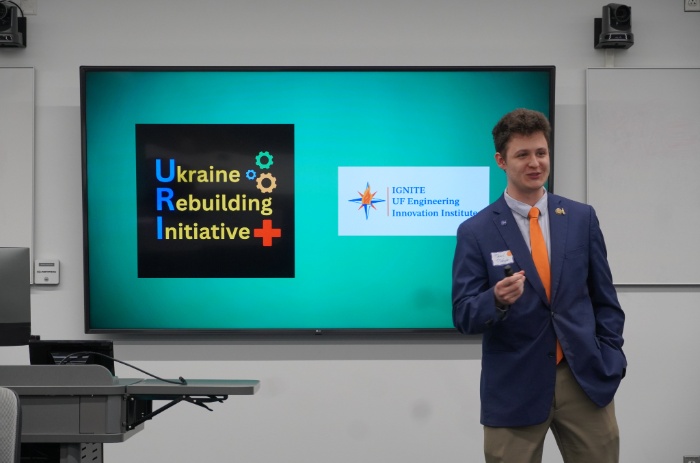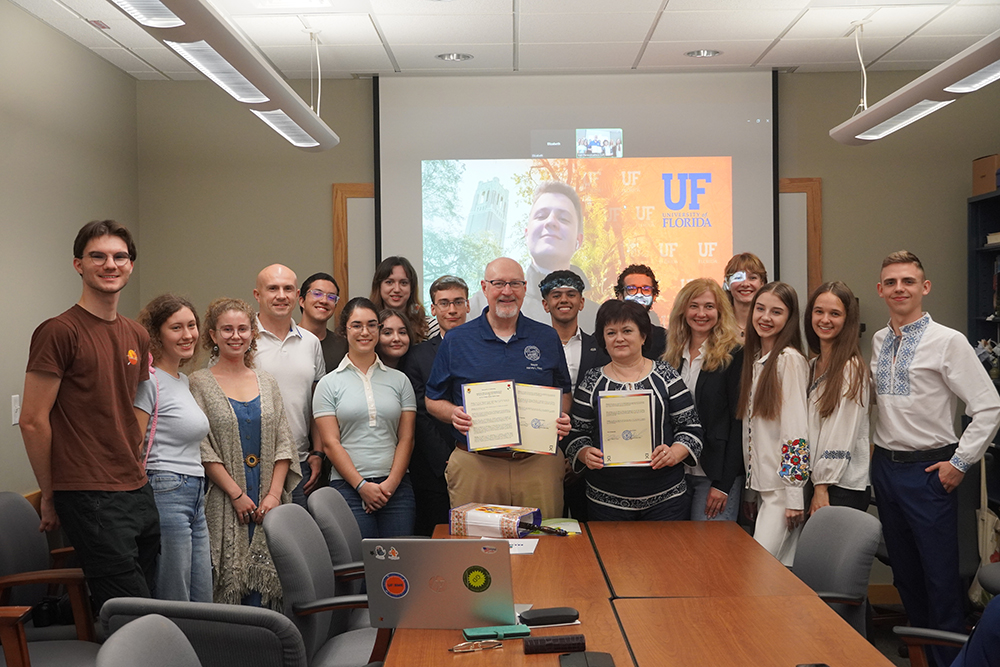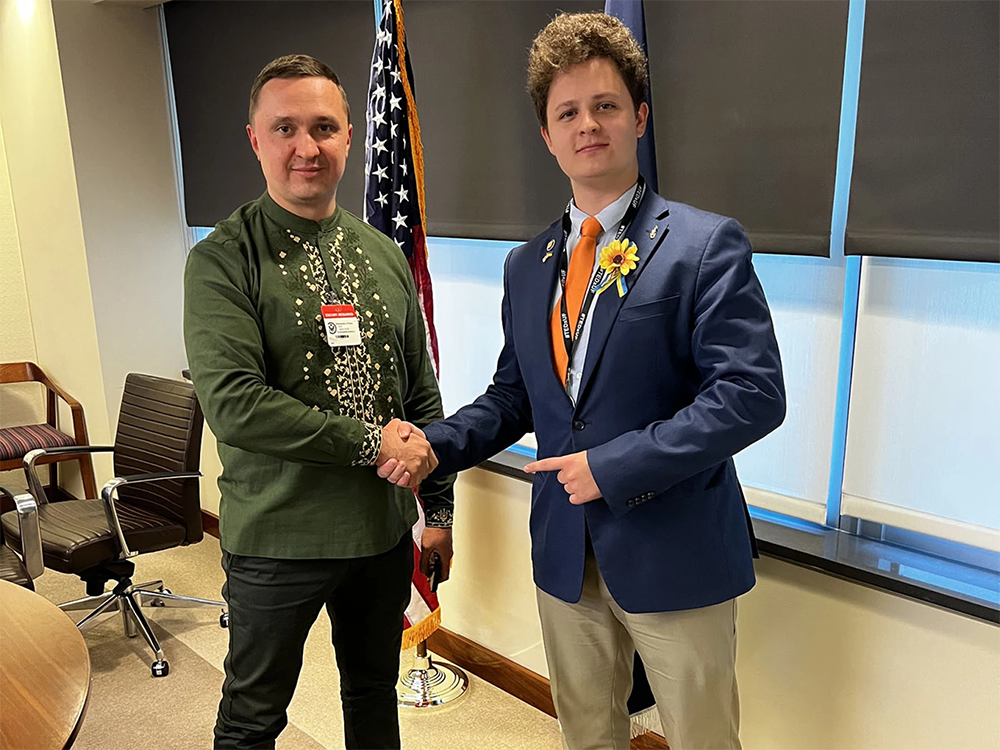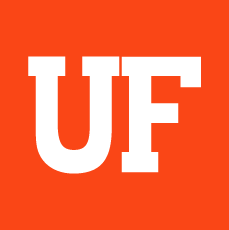
The fall of 2023 found Mikhail Mikhaylov growingly frustrated by a sense of helplessness with the ongoing war in Ukraine, so he decided to channel his energy into something more constructive. Months later, he had co-founded the Ukrainian Rebuilding Initiative, a project-based non-profit working to help Ukrainians in five areas: civil engineering, public health, prosthetics, agriculture, and cultural affairs. For the cultural component, he joined forces with Russian Culture Club President Grace Wright, and in no time they had orchestrated a Sister City partnership between Gainesville and the Ukrainian city of Nizhyn, located about 90 miles east-northeast of Kyiv, and a virtual cultural exchange with students at Nizhyn Gogol State University. Read on to learn of the origins and operations of their initiative, and how their respective heritages (Ukrainian for Grace, Russian for Mikhail) have informed their experiences.


MSG: Tell me first how the original idea for the Ukrainian Rebuilding Initiative came about?
Mikhail: The concept originated in the latter portion of 2022, but it wasn’t until the summer of ’23 that we initiated those real conversations with student government and actually formalized the abstract concept into concrete, tangible things.
It started with a group of students that included Grace, me, and a couple others who shared a threefold emotional reaction to the war. We felt responsible to help somehow, we felt guilty for not helping enough, but simultaneously, we felt as though there was no outlet for doing so, which left us with a sense of powerlessness. We all had different talents and skill sets — political science students, engineering students, public health students, agricultural sustainability studies — all diverse backgrounds. And we wanted to get together and create an entity that could tailor our skills to the mission statement of helping heal the community abroad.
At that time, we didn’t really know what that meant, and it wasn’t until my internship with the State Department in D.C., where I had the pleasure of meeting Oleksandr Kodola, the mayor of the city of Nizhyn in Ukraine, where I shared these ambitious ideas that we had on campus. I told him I had connections with the mayor of the city of Gainesville, Harvey Ward, since I previously worked with him as a research analyst. And the idea of sister city creation was something that was developed between the two of us. A year later, we had both mayors’ signatures on a sister city agreement drafted by our pre-law students. It was a monumental moment for us because it showcased that a student-led initiative like this could actually get something done.
That’s when we started to infuse this sister city alliance with different division projects: bomb shelter construction with our engineers; prosthesis design for the veteran amputees; a cultural exchange program that Grace is leading with the Gogol State University with the help of UFIC; an agricultural research division interviewing farmers and asking them how the conflict has impacted their lifestyle, their water quality, and things of this nature; and then public health, which is trying to create medical and nutrition-based packages, collaborating with different organizations on campus to send to the city of Nizhyn, hopefully to their orphanages, hospitals, and other medical centers that need basic sanitation and necessities for their populace. So that’s kind of the origin story of the Ukraine Rebuilding Initiative at the University of Florida.
MSG: Grace, you came on board right around the same time. What was going through your head when you joined in on this ambitious initiative?
Grace: So I basically talked to Misha at the beginning of last summer of 2024. We did a collaboration with them for Russian Culture Club, but I never officially came on board until I was talking to Misha about everything, and we were talking about the cultural affairs project, and it just felt like a great fit for me to get involved.
I had already done a program like the one that we built for URI with a different organization where I spent an hour of my day once a week talking to students in Ukraine who were interested in perfecting their English. So I saw what URI was starting to do and I wanted to be a part of it. I brought my previous experience with that program, and I said, I think I can help lead this with you. So that’s how I joined.
MSG: This is extremely ambitious. How many people on the Florida side are now currently involved in some aspect of this project?
Mikhail: I think consistently around 10 to 15. But we have students who are interested in helping with smaller projects, which I would estimate is somewhere around 35.
MSG: And when you’re developing projects with a broad range from agriculture to intercultural exchange to the construction of bomb shelters and prosthetics, do you have members of your group who are actively knowledgeable in those areas, or is that where you reach out to specialists on campus and bring them in on a more temporary basis?
Mikhail: Of course, we kind of do both to some extent. The civil engineering division specifically is tailored towards civil engineers. A lot of our students are majoring in this or are already working in the field. So they’re soft experts, but we also definitely communicate with staff and faculty with the College of Engineering.
Our last collaboration with the Herbert Wertheim College of Engineering was a summit, a 24-hour design summit, where we invited students outside of our organization to participate, giving feedback or putting their own spin on our projects. Then we had faculty from the College of Engineering overlook these designs and processes to make sure that they’re state of the art or evidence-based.
MSG: You mentioned communication. You’re dealing with not only communicating across a variety of disciplines and specialties, but also across cultures. How have you been able to navigate that, both from a cultural perspective and linguistically, particularly with the folks you’re working with in Ukraine?
Mikhail: It’s definitely a very tricky subject matter, and of course, we try our best to be culturally sensitive. Thankfully, a lot on the Nizhyn side are understanding that most of our students don’t speak Ukrainian. So they do tailor conversations, and if they aren’t able to comfortably explain something in English, we do switch to Russian sometimes, especially with Mayor Kodola. Some of his staff genuinely do not speak English at a high enough level.
We also approach it with passion and ambition to understand and learn Ukrainian as well. I’ve always had a desire to learn Ukrainian to the capacity that they’ve learned English, and I always emphasize that their English is way better than my Ukrainian. We also have professors like Professor Kleespies who has advised us on these culturally sensitive matters, and she has made sure that we have established respectful boundaries when it comes to cultural things. So I’m really grateful that we were able to have her join our team on our advisory board, specifically because of her cultural awareness and her high level of respect for the matter.
MSG: Grace, I know you have the not uncommon combination of Ukrainian and Russian connections in your family and your studies. How have you been able to negotiate the relationship between those both culturally and linguistically in the context of a war that has somehow managed to complicate things incredibly?
Grace: Well, for me, my immediate family and even my extended family only come from Ukraine. So even though I am learning Russian and I am in Russian studies, I feel confident in my identity. I can empathize with students who have family both in Ukraine and in Russia, which I feel is so much harder when you’re grappling with what’s going on between both sides.
But for me, I feel very comfortable in how I present myself and my family and my connections to my culture. When I first started learning Russian in 2021, I wanted to learn a language that my family spoke, and UF unfortunately didn’t offer Ukrainian, and my whole family is fluent in both. So I chose Russian, and then when the war started, there was definitely a time where I was like, I’m going to keep going with my Russian, but I understand now that maybe this isn’t the best language for me to learn anymore. I always say, if I could have switched to Ukrainian, I probably would have, especially because it is the main language that my entire family speaks. But at this point, the Russian department at UF is so amazing and I appreciate every student and every faculty member in the department. So I would say that I’m secure in my learning of Russian.
Sometimes talking to people who don’t quite get it, you know, you get an eyebrow raise where they don’t understand why you’re learning Russian if you’re Ukrainian or if your mom’s from Ukraine, but you just gently explain it and then you move on your way and everything’s okay.
MSG: How has the URI been doing financially? Do you have reliable funding sources that help you move things along?
Mikhail: Of course. We initially began specifically relying on student government funding for specific events or catering or venues or things of that nature. We then switched over to getting donations from philanthropic individuals, but also doing charity fundraising events to raise money.
With the help of student legal services, we were actually able to get a 501(c)(3) nonprofit constructed. So we have tax-deductible status that we’re able to take advantage of and leverage towards fundraising. Most importantly, we also received a $10,000 grant from Projects for Peace, an entity from Middlebury College. It’s quite a prestigious, competitive grant that we applied for, and we’re very thankful that we got it. A lot of the students that we’re working with have their names on this grant now, which hopefully is also a trampoline towards their careers. We’re very excited to actually put that $10,000 to use this summer during the time period of the grant.
MSG: That’s fantastic. With both of you graduating, what does the future of URI look like? Hopefully this war comes to an end soon, but there will be a lot of rebuilding needed. How are you ensuring that URI lives on after the two of you go on to bigger and greater things beyond the university?
Grace: Every division leader was tasked with the responsibility of finding a member who is interested in taking over the division after they graduate. One of my participants in the conversation partner program expressed interest in running the program next year. So this summer, before I start law school, I’m just going to be working with her. We’re going to plan out the fall semester. We wanted to do more cultural workshops or even specific language workshops. Our Ukrainian partners expressed interest in doing a very beginning introduction to Ukrainian for our students in exchange. I know some of our students were excited for that. So I’m very excited for the future of specifically cultural affairs.
Mikhail: I would like to echo Grace’s excitement for the project in general. Because we were able to make it into a nonprofit, this allows for students like myself and maybe even Grace to continue pushing forward after graduation. That enters a realm of more professional engagement with it. No longer is this just a university entity — it’s now a federally recognized nonprofit.
I would love to continue opening different chapters at different universities. We’ve already begun conversations and started another chapter at the University of Central Florida, and potentially would love to expand that to FSU. They have a fantastic Ukrainian task force that we’ve already gained support from, and they were one of the letters of support that we submitted along with our grant proposal for Projects for Peace.
So there’s a lot of support. I would love to leverage that and make sure that we are growing as an entity as a whole, making sure that we are helping heal and rebuild communities that maybe even go beyond the city of Nizhyn. Maybe it’s different sister city, maybe it’s different regions around Ukraine. Or maybe it’s not even just Ukraine — it’s other countries that need assistance, all tailored towards the students’ interests.
The nonprofit is called Off the Battlefield Foundation, so it doesn’t have to be only homed in on Ukraine. It could touch a broader sense of the mission statement. Plus, whatever university I go to, whether that be Oxford, Yale, etc., I would love to have a chapter there, and I would love to lead it with all my passion and drive that I’ve shown to the University of Florida.
MSG: Excellent. Given that this interview will go out to Russian studies alumni and students, where can people go if they are interested in finding out more, helping out, making charitable contributions?
Mikhail: If you’d like to find us, we have a website: offthebattlefield.org. If wanting to assist, of course, on that website we have a donation page that is easy to access. Spreading awareness would be great – we have things on social media, on LinkedIn, for example. Or when we host events in the future, we’d love to see people join, whether that be virtual or in person.
MSG: Grace, do you envision any sort of in-person exchanges sometime in the next few years? Would that be something that we could hope to see — citizens or students from Nizhyn Gogol University over this way, or our students and faculty going in that direction once things settle down?
Grace: The current memorandum of understanding between universities does not allow for it for obvious reasons, but I do think someday we might have students from Nizhyn who would be interested in studying at the University of Florida, and I do think we could get students from UF to go over there. So maybe one day this partnership will offer not only virtual interaction but in-person exchanges as well. I think it is a real possibility.
MSG: Thank you both for sharing your experiences with the Ukrainian Rebuilding Initiative.
